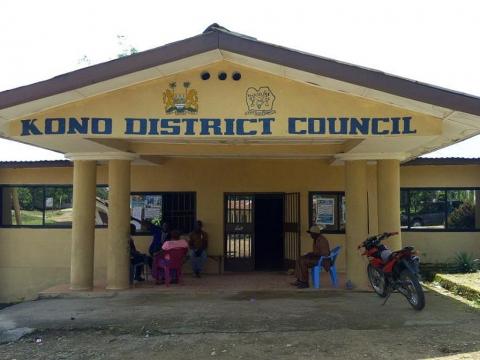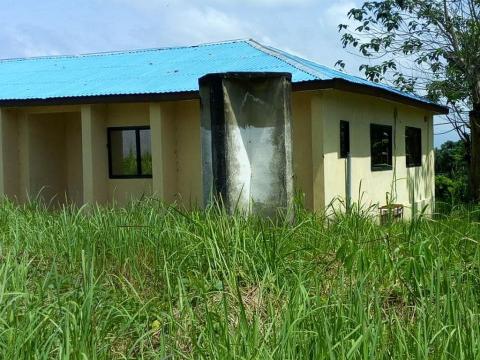By Septimus Senessie in Kono
The leadership of the Kono District Council in eastern Sierra Leone is under pressure over an alleged misuse of its budgetary allocation with accusations of miss of funds meant for the poor.
The Council, which came to the spotlight during the Local Councils Bilateral Budget Discussion for the 2017 Financial Year, stands accused of spending a huge chunk of its allocations during the 2016 budget implementation on non-development oriented activities. Of particular concern is money spent on reception and hospitality for visiting government officials.
In a public meeting organised by the Local Government Department of the Ministry of Finance in Koidu, council officials defended the use of the money, amounting to Le 706,332, 816.
In a power point presentation, the Council’s Finance Officer, Abdul Agenda Kpange, said they received the sum of Le 394, 494,873 from own source revenue and Le 311, 837,943 from the central government. All of that amounted to the grand total of Le 706,332, 816.
He said they used the money for things like printing of receipt books, procurement of fuel, vehicle maintenance, as well as for entertainment during council’s monthly meetings.
Part of the money, according to him, went towards paying salaries for junior staff, electricity bill, stationery, and sitting allowances for Councillors and their ward committee members.
However, from the presentation, the activities the Council claimed to have implemented with the Le311, 837, 943 disbursed by the Central Government were more or less the same activities that featured under the Le 394, 494,873 generated from own source revenue for the same year, except for a slight difference as occasioned by the payment of annual rent allowances for the Council’s key management officials – Chairman, Deputy Chairman, Chief Administrator, Deputy Chief Administrator, and the Finance Officer.
The council also said it used part of the money to pay for telephone allowances for core staff.
During the year under review, Le 22, 240, 000 of the own source revenue was spent on “official reception and hospitality”, with details showing spending on lodging, feeding and transportation for government officials on visit to the district. This was particularly a major source of acrimony for the Ministry of Finance and civil society
activists.
Alpha Umaru Jalloh, Director of the Local Government Finance Department in the Ministry frowned at the Council putting aside special funds for government officials who were already entitled to better facilities than the rural poor community they were out to serve.
“Government officers on official tours to the councils are provided lodging, per-diem and transportation,” he said, adding: “the Council shouldn’t put aside special funds meant for the development of the rural poor for government officials.”
Jalloh said he would ask the Council to repay money spent on such matters if he were in charge.
However, Tamba Musa, Chief Administrator of the Kono District Council, defended the use of the money on government officials.
“We put such funds aside for government officials on visit to our districts because when we are defending our annual budget in parliament, MPs always warn us to facilitate the movement of government officials, provide them with lodging and feeding while on official assignment in our district. That’s the reason why we have been putting aside such funds for this purpose.”
Members of the Civil Society were particularly bitter and sounded frustrated following the presentation, and accused the Council of seeking to enrich themselves at the expense of the masses.
Ibrahim Sahr Ahmed Bockarie, Chairman of the Kono-based Campaign for Just Mining, said the presentation confirmed that the Council was concerned about the welfare of its staff, while the people languished in a “vicious circle of poverty”.
He said the council was not focused on community development, rather was concerned with things that didn’t bring forth any tangible development.
He warned that if proper monitoring mechanisms were not put in place against the Councils’ financial management, it would undermine the real essence of the decentralisation process of governance in the country.
The Executive Director of Advocate for Social Justice and Development (ASJD), Arthor Kargbo, said that if the Council was convincing the people to pay their taxes for the development of their communities, the authorities shouldn’t be seen using the money on themselves, while leaving the taxpayers to languish in poverty.
According to the Council’s presentation, it spent Le 70, 208, 000 as salary for junior staff in 2016. But the premises of the Council remain badly kept with litters deposited all over its compound and buildings covered by tall grass.
When Politico challenged the Chief Administrator of the Council on this, Tamba Musa remarked that they were operating the council “under a difficult circumstance with over three months now without salary for staff.”
Meanwhile, in its projection for the 2017 financial year, the Kono District Council has earmarked over Le 1 billion for activities similar to those it supposedly implemented in 2016.
Copyright (c) Politico 2016










